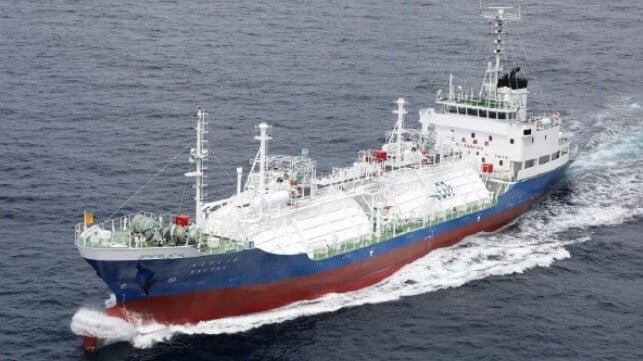Mitsubishi Shipbuilding and Nippon Gas Line Advance Development of LCO2 Carrier Vessel
Mitsubishi Shipbuilding Co. in collaboration with Nippon Gas Line is making significant progress in the development of a specialized liquified CO2 carrier vessel tailored for the coastal market in Japan. While the industry is focused on the increasing demand for CO2 carriers to support carbon capture and storage projects, this project specifically targets the unique needs of the Japanese coastal region.
With a strong emphasis on promoting the development of LCO2 carriers and establishing CCS value chains, Mitsubishi Shipbuilding has engaged in various projects to advance this sector. Working with Nihon Shipyard Co., they are jointly developing an ocean-going liquified CO2 carrier. Additionally, in partnership with NYK, they have explored concepts for a vessel capable of transporting both CO2 and ammonia. Another collaboration with Nippon Gas Line aims to develop a value chain for transporting captured CO2 to storage sites in Malaysia.
The demand for LCO2 carriers is expected to rise alongside CCS projects involving the marine transport of captured CO2 in Japan to storage facilities. Mitsubishi Shipbuilding and Nippon Gas Line have conducted a study to assess the transportation needs of CO2 captured in the Seto Inland Sea area, potentially destined for overseas storage locations.
In late 2023, Mitsubishi Shipbuilding completed the construction of a small-scale demonstration LCO2 carrier with a cargo tank capacity of 1,450 cubic meters. This project, supported by the Japanese government, aimed to build expertise in the sector and establish standard specifications and designs for LCO2 carriers, as well as develop a construction supply chain.
Following the successful completion of a concept study, Mitsubishi Shipbuilding and Nippon Gas Line have received Approval in Principle from ClassNK for a low-pressure type coastal LCO2 carrier designed to meet the needs of emitters in the Seto Inland Sea area. This certification paves the way for the development of versatile small-sized LCO2 carriers to facilitate CO2 collection in Japan for overseas shipping.
The companies are targeting the commencement of LCO2 carrier construction by 2027, with commercial operations expected to start by 2028, showcasing their commitment to advancing sustainable transport solutions for the carbon capture and storage industry.

